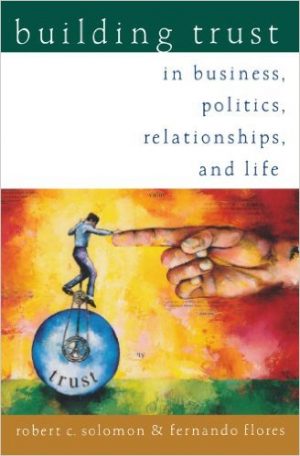Building Trust: In Business, Politics, Relationships and Life

In a former life I ran a Novell MHS based mail delivery system. This was before the Internet was commercial and when I was working with suppliers from across the globe. We found that faxes weren’t very reliable and we needed a better way to deliver mail. The email client was The Coordinator by Action Technologies. It had the distinction of mapping email messages into types of commitments that we were making with one another (request for action, request for meeting, etc.) It was based on the thinking of Fernando Flores and to a lesser extent his book (together with Terry Winograd) Understanding Computers and Cognition. Because of this I had a sense of nostalgia when I was researching building trust and saw Building Trust: In Business, Politics, Relationships, and Life by Fernando Flores and Robert Solomon.
I was concerned because I remembered that Understanding Computers and Cognition was a bit philosophical and hard to convert into practical use. It’s a good thing to think about – but difficult to leverage. In fact, that was one of the things I admired about The Coordinator, it was a good way to take the philosophy and turn it into something real.
Unfortunately, Building Trust is similar as it reads more like a philosophy dissertation than a mass-market book. However, it’s not without merit if you’re struggling to understand what trust is – and how it works. Perhaps my favorite piece in the book is an exercise where the authors would ask audiences to complete the following: “Trust is _____.” The most common answer is “earned” and in all candor that’s the answer I would have given before reading the book. Instead through reading the book I would say that “Trustworthiness is earned.” And that “Trust is given.”
The book sets out many examples of how we confuse trust and trustworthiness as well as how trust must sometimes be given when the other person isn’t trustworthy and importantly how trust has limits.
The book describes three kinds of trust:
- Basic Trust – Un tested often overlooked trust. The authors assert that most trust is basic – and unconscious.
- Blind Trust – Trust that ignores all factors including evidence (or lack there of) of trustworthiness on the part of the recipient. This is also called naive trust.
- Authentic Trust – A conscious form of trust where the limits of trust are exposed and thought about.
One key point is that while we tend to believe that trust is an absolute, the reality is that trust does – and should – have limits. You wouldn’t necessarily trust your attorney to watch your children – though you almost certainly trust his advice on legal matters.
If you’re up for challenging your beliefs on trust, you should pickup Building Trust.
